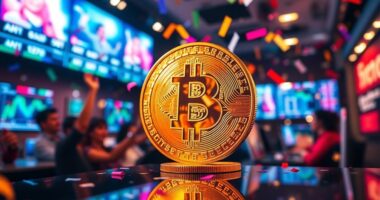You might have heard Peter Schiff's strong stance against the idea of Bitcoin as a reserve asset. He's not shy about calling its promotion "fraudulent," warning of potential economic chaos. Schiff argues that Bitcoin, unlike traditional assets, lacks real stability and value. This criticism raises important questions about the future of cryptocurrencies in national finance. Could this volatility lead to a financial crisis? The implications are worth considering.

Peter Schiff has thrown down the gauntlet, challenging the idea of a Bitcoin reserve amid growing political support. With figures like Senator Cynthia Lummis advocating for it and even Trump suggesting a national Bitcoin reserve, Schiff's criticism highlights significant economic concerns. He argues that adopting a Bitcoin reserve could destabilize the dollar, leading to its devaluation. If the government starts purchasing Bitcoin, the initial surge in demand would likely benefit early investors, creating a bubble that might burst, causing chaos in the market.
You might find it troubling that Schiff raises the specter of hyperinflation. He warns that if the government continues to print more money to buy Bitcoin, it could push inflation rates through the roof. This could erode trust in the dollar, as people start to question its stability. Schiff emphasizes that the process is ultimately unsustainable, suggesting that such actions would only undermine confidence in the U.S. currency.
When you look at Schiff's historical skepticism towards Bitcoin, it's clear he views it as more of a speculative bubble than a secure asset. Although he recently acknowledged Bitcoin as "digital gold," his endorsement of a strategic reserve concept still raises eyebrows. He compares Bitcoin unfavorably to gold, which has shown more consistent growth in market cap over time. This comparison points to Schiff's belief that Bitcoin lacks the inherent value and stability that gold possesses. Schiff's assertions about Bitcoin's potential collapse are underscored by the idea that establishing a Bitcoin reserve could lead to the dollar becoming worthless.
Moreover, Schiff's critique extends to the broader implications of a Bitcoin reserve for global financial stability. If governments engage heavily with Bitcoin, it could lead to dangerous economic bubbles, destabilizing not just the U.S. economy but the global market as well. The volatility and liquidity risks associated with Bitcoin make it a precarious choice for strategic reserves.
Since Schiff's recent comments, Bitcoin's price has surged, reflecting a shift in market sentiment. Increased trading volumes and a rise in the Crypto Fear & Greed Index indicate that his words have influenced investor behavior.
However, while some may see this as a positive development, others might worry about the potential repercussions of such a volatile asset being integrated into government systems.
As you consider the implications of Schiff's stance, it's essential to weigh the risks against the supposed benefits of a Bitcoin reserve. The debate is far from over, and the economic consequences could be profound.









